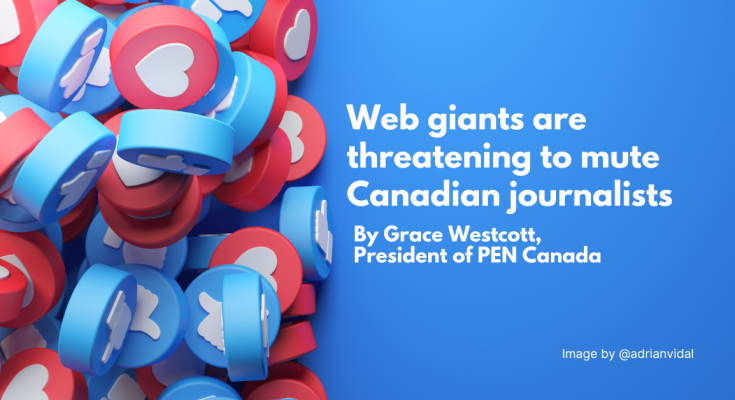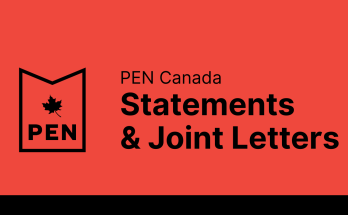The following Op-Ed by PEN Canada President Grace Westcott appeared in the Toronto Star on July 29, 2023. Since then, Meta (the parent company of Instagram and Facebook) has announced that it has begun to remove access to Canadian news — and the ability of its Canadian users to share Canadian news — from its platforms.
Web giants are threatening to mute Canadian journalists
July 29, 2023. A whole world of disinformation is at your fingertips on Google and Meta. Quack remedies, conspiracy theories, fake news manufactured by bot farms in Russia and China, are a click away.
But if you are looking for reliable, fact-based Canadian news, or long-form essays by our country’s leading thinkers and writers, well, that’s harder to find, and about to get a whole lot harder, courtesy of Facebook.
With ruthless disregard for Canadians’ welfare, Meta, like a kind of digital despot, has responded to legislation passed by the Parliament of a sovereign nation by punishing that country’s citizens. It is planning to deplatform and silence Canadian journalism on Facebook, in full knowledge that a large percentage of the population relies on that platform for delivery of Canadian news.
PEN Canada views this as an abusive attack by Facebook on journalists and our nation’s democracy, in the name of protecting its profits.
Google and Meta now hoover up more than 90 per cent of online advertising revenues in Canada, leaving crumbs for reputable media outlets. Canada’s Bill C-18, the Online News Act that became law on June 22, is intended to provide a legal framework to address this gross imbalance by requiring the platforms to negotiate ad revenue-sharing agreements with Canada’s news media. It is based on a successful model adopted in Australia two years ago, that has been a significant shot in the arm for that country’s news media.
The response of the web giants was as immediate as it was extreme. The day the act was made law, Meta announced it would block Canadian news for all Canadian users, rather than be subject to the act. Google made a similar announcement a week later, saying it would cut off not only Google News, but Google Search for Canadian news for Canadians. Indeed, earlier in the year Google had already carried out feasibility testing to do so.
Unlike Facebook, Google is continuing to talk with the government, to discuss ways the act through regulations can address some of its concerns. Google is well aware that removing Canadian news would degrade and distort its service at a time when it faces increasing competition from AI-based search models. Let us hope that good sense prevails.
Facebook, however, seeks to make an example of Canada. It would prefer not to be obliged by law to bargain with news organizations to compensate for the access to news that lends value to its business.
To protect its business operations against such laws, Facebook is willing to make Canada the battleground and Canadians the victims, to fight our legislation. Similar legislation is pending in several other jurisdictions, including the state of California and in the U.S. at the federal level, where the bipartisan Journalism Competition and Preservation Act almost passed in the Senate last year. Indeed, Sen. Amy Klobuchar is currently cheering Canada on, asking our government to stand firm against the platforms’ campaign of intimidation.
Governments around the world are watching and planning their own laws to force the platforms to return value to the news media. There is widespread recognition that authoritative, reliable, professional news is critical to democratic political culture, now more than ever.
Whatever the alleged faults of the Online News Act, they are nothing to the damage Facebook’s drastic and abusive measures will do. This is not about lofty principles. This is about profit, and a refusal to share it.
Much has been made of the so-called “link tax,” and how “paying for links” will “break the internet.” These are misnomers, slogans and exaggerations. The act does not tax links, or mandate payments for links. It simply requires the platforms to negotiate fair payment for making available Canadian news from news media organizations by a variety of means, including links.
The evidence of actual damage is all in the other direction: the well-documented damage suffered by the news media due to the migration of ad dollars to the platforms.
Both Google and Meta have built businesses worth many billions of dollars based on the value of links. In so doing, they have been draining our professional news media of the ad revenue that allows them to perform an essential democratic function: providing reliable public interest and political information.
Facebook should be under no illusion that Canadians will accept being held to ransom for our own news. This is patently the behaviour of a bully. The blame for this move lies squarely at Facebook’s door.
Grace Westcott | President, PEN Canada




